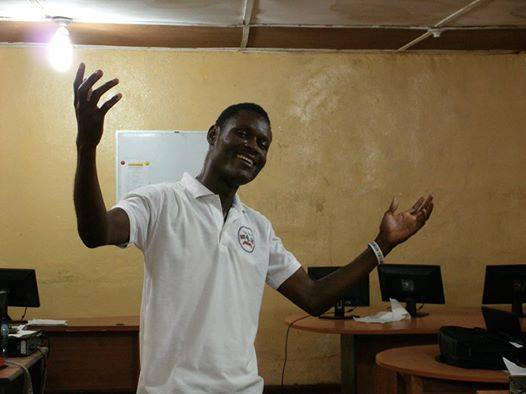For Al-Varney Rogers, a JHR alumni and reporter at Front Page Africa, nothing was sweeter than seeing the Liberian government announce a bill to help mentally ill people across the country.
Al-Varney, 28, has been reporting on the lack of a mental health policy, training, treatment, funding, and the stigma associated with mental health issues since 2012. He was overjoyed when President Ellen Johnson Sirleaf announced the legislation in her State of the Nation address in January. Many believe that it is thanks to Al-Varney and his sharp, consistent reporting that the president finally decided to take action. “With very few other journalists in Liberia reporting on this topic at all, let alone with Rogers’ perseverance, I don’t think the proposed legislation would exist without him,” says Travis Lupick, a Journalists for Human Rights trainer who worked with Al-Varney in 2012. Al-Varney studied mass communication at the University of Liberia and worked closely with Travis on human rights stories.
“JHR taught me generally on reporting on human rights abuses and mental health is no exception,” he explains. “I’m happy to be associated with JHR. They took a student doing journalism and turned him into a full journalist who is reporting for one of Liberia’s best newspapers.”
Al-Varney became interested in mental health reporting after taking a seminar on reporting on mental health with Dr. Janice Cooper of the Carter Center. Dr. Cooper spoke to the aspiring journalists about mental illness, mental health and best practices for reporting on them. Inspired by the workshop, Al-Varney started regularly reporting on mental health with Travis’ support. One of his first stories in the area was about the struggle to rebuild Liberia’s mental health sector after years of civil unrest.
“Reporting on mental health issues has become a passion and something I feel obligated to do,” he explains. “Al-Varney deserves the vast majority of the credit for his work,” says Travis. “But I think it’s fair to say that it was JHR and the Carter Center that helped spark his interest in reporting on mental health.” Al-Varney knows first hand what havoc mental illness can bring. He watched a family member become ill and suffer tremendously. But he also saw – with support and treatment – that family member recover and go back to work. “When I see mentally ill people wandering the streets of Monrovia it pains me,” says Al-Varney. “Because I know with family support and an improved mental health programs by the government they, too, can get well.”
When Al-Varney first began reporting on mental illness there was only one medical facility that dealt with mental illness in Liberia. And it only had 20 beds. The lone facility was supposed to serve a population of 3.5 million. There were less than 30 mental health doctors and only one practising psychiatrist, he says. What’s more, he explains, many people thought those suffering mental illness were bewitched. The government announcement bring him hope, but the work is not done. “I will continue to shine a light on mental health issues and I will follow this legislation until it is passed into law,“ Al-Varney says. Spoken like a truly committed human rights journalist.
By Debra Black for Journalists for Human Rights



